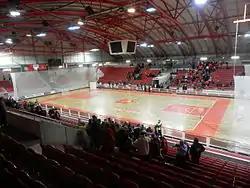Pavilhão Fidelidade
The Pavilhão da Luz Nº 1, currently known as Pavilhão Fidelidade for sponsorship reasons, is the main arena of Portuguese multi-sport club S.L. Benfica. It has a full capacity of 2,400 seats and is mainly used by the basketball, futsal and roller hockey departments of the club.
 | |

| |
| Full name | Pavilhão da Luz Nº 1 |
|---|---|
| Former names | Pavilhão Açoreana Seguros (2003–08) Pavilhão Império Bonança (2008–13) |
| Address | Av. Eusébio da Silva Ferreira, 1500-313 |
| Location | Lisbon, Portugal |
| Coordinates | 38.751259°N 9.183613°W |
| Public transit | Alto dos Moinhos and Colégio Militar/Luz Lisbon Metro Blue Line |
| Owner | S.L. Benfica |
| Capacity | 2,400 |
| Construction | |
| Built | March 2002 – February 2004 |
| Opened | 28 February 2004 |
| Architect | Damon Lavelle |
| Tenants | |
| Basketball Futsal Roller Hockey | |
| Website | |
| slbenfica.pt | |
Built at the same time as the new Estádio da Luz, it was designed from the start to replace the 37-year old Pavilhão da Luz, which was torn down in March 2003.[1][2] Opened on 28 February 2004, during the celebrations of the club centenary, its first game opposed the basketball section against Ovarense.[3] Its features include an NBA-style scoreboard, and other standard amenities like safety nets behind the goals, press boxes, five locker rooms, bars, medical offices and accommodation to handicapped fans.[3] Eight months after its opening, Benfica sold the arena naming rights to Açoreana Seguros for a fee rumoured to be close to €1 million.[4]
References
- "Seara Cardoso abre "caixinha" da nova Luz" [Seara Cardoso opens "little box" of the new Luz]. Record.pt (in Portuguese). 4 December 2002. Retrieved 21 March 2016.
- "Últimas emoções no Pavilhão da Luz" [Last thrills in Pavilhão da Luz]. Record (in Portuguese). 15 March 2003. Retrieved 21 March 2016.
- "A catedral das modalidades" [The cathedral of sports]. Record (in Portuguese). 28 February 2004. Retrieved 21 March 2016.
- "Açoreana Seguros dá nome ao pavilhão" [Açoreana Seguros gets naming rights]. Record (in Portuguese). 7 October 2004. Retrieved 21 March 2016.